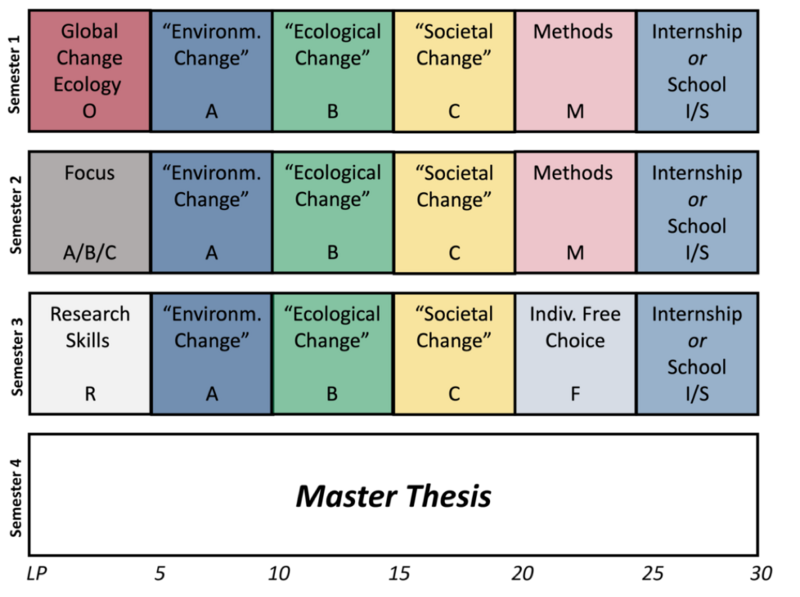Structure
The general structure of the program (120 ECTS) brings together natural sciences (70 %) and social sciences (30%).

The obtained degree is a Master of Science. Based on additional research activity, a PhD degree can be obtained.
The courses in the graduate program require a high level of performance. Students are selected via a standardized aptitude assessment procedure (see regulations for more details) that meets the highest international criteria. Bachelor degrees related to all fields of environmental science will provide for acceptance to the program. Finally, a select number of students will be accepted who may profit from excellent infrastructure and direct one-on-one communication with their supervisors.
Modules & Courses
Course modules are subdivided into A, B, C and M. Hereby, A and B focus on environmental change and ecological change. The C module group addresses the interdisciplinary nature of global change, dealing with the integration of natural and social sciences. M courses aim at teaching methods relevant for other courses. The language of instruction is English. I and S modules represent the unique opportunity to credit internships and science schools as a part of the program.
A: Environmental Change
In this module group, students will have the opportunity to learn about global change. The focal point hereby is placed on the physical and chemical aspects of aquatic and terrestrial ecosystems, the dynamics of climate change, recent and historical developments, land use change as a determining factor for biotic and material changes as well as biogeochemical cycles are of particular interest.
B: Ecological Change
In the modules of the block ecological change, the ecological effects of global change will be addressed. Among others, the topics include the response of organisms and ecosystems, land use change and human impacts, as well as the impacts on species distribution within the framework of global change and changing environmental conditions.
C: Societal Change
Global environmental changes have, on the one hand, been caused by anthropogenic influences. Simultaneously, society also has to bear the consequences of climate change and ecosystem changes. The module block C deals with the global interplay between societal and ecological changes.
M: Methods courses
Methods courses are offered in order to deepen knowledge of methodological approaches in various fields, whereby the personal interests of students can be strengthened. The methods courses offered adhere to those applied in current global change research including statistical modeling, time series analysis, spatial analysis tools, environmental economics as well as key soft skills and more.
I: Internships
The study of global change ecology lies not only in course modules, but also offers the opportunity to gain practical experience via internships. Internships are possible within four main areas including economy, research, administration (national or international) and international organizations (including consortia).
S: Schools
Science schools aim at integrating students in current developments in the rapidly changing scientific field of global change research. Intensive external and internal courses allow for students to make direct contact with not only other lecturers and real-world practitioners but peers or other study programs, universities and countries.
R: Research Skills
Research Skills (R) module prepares students for the master thesis. This module comprises three courses. The seminar "Scientific Writing and Organising Research Data", the exercise "Preparation of a research plan" individually coordinated with the supervisor and the symposium "Environmental System Sciences: Global Change Ecology", where students present their thesis to their fellow students and lecturers .
Figure on the overview of the 4 semesters:


